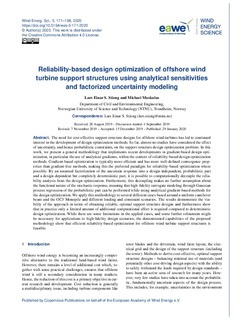| dc.contributor.author | Stieng, Lars Einar Sørensen | |
| dc.contributor.author | Muskulus, Michael | |
| dc.date.accessioned | 2020-02-07T06:52:59Z | |
| dc.date.available | 2020-02-07T06:52:59Z | |
| dc.date.created | 2020-02-06T10:54:02Z | |
| dc.date.issued | 2020 | |
| dc.identifier.citation | Wind Energy Science. 2020, 5 171-198. | nb_NO |
| dc.identifier.issn | 2366-7443 | |
| dc.identifier.uri | http://hdl.handle.net/11250/2640126 | |
| dc.description.abstract | The need for cost-effective support structure designs for offshore wind turbines has led to continued interest in the development of design optimization methods. So far, almost no studies have considered the effect of uncertainty, and hence probabilistic constraints, on the support structure design optimization problem. In this work, we present a general methodology that implements recent developments in gradient-based design optimization, in particular the use of analytical gradients, within the context of reliability-based design optimization methods. Gradient-based optimization is typically more efficient and has more well-defined convergence properties than gradient-free methods, making this the preferred paradigm for reliability-based optimization where possible. By an assumed factorization of the uncertain response into a design-independent, probabilistic part and a design-dependent but completely deterministic part, it is possible to computationally decouple the reliability analysis from the design optimization. Furthermore, this decoupling makes no further assumption about the functional nature of the stochastic response, meaning that high-fidelity surrogate modeling through Gaussian process regression of the probabilistic part can be performed while using analytical gradient-based methods for the design optimization. We apply this methodology to several different cases based around a uniform cantilever beam and the OC3 Monopile and different loading and constraint scenarios. The results demonstrate the viability of the approach in terms of obtaining reliable, optimal support structure designs and furthermore show that in practice only a limited amount of additional computational effort is required compared to deterministic design optimization. While there are some limitations in the applied cases, and some further refinement might be necessary for applications to high-fidelity design scenarios, the demonstrated capabilities of the proposed methodology show that efficient reliability-based optimization for offshore wind turbine support structures is feasible. | nb_NO |
| dc.language.iso | eng | nb_NO |
| dc.publisher | Copernicus Publications | nb_NO |
| dc.rights | Navngivelse 4.0 Internasjonal | * |
| dc.rights.uri | http://creativecommons.org/licenses/by/4.0/deed.no | * |
| dc.title | Reliability-based design optimization of offshore wind turbine support structures using analytical sensitivities and factorized uncertainty modeling | nb_NO |
| dc.type | Journal article | nb_NO |
| dc.type | Peer reviewed | nb_NO |
| dc.description.version | publishedVersion | nb_NO |
| dc.source.pagenumber | 171-198 | nb_NO |
| dc.source.volume | 5 | nb_NO |
| dc.source.journal | Wind Energy Science | nb_NO |
| dc.identifier.doi | 10.5194/wes-5-171-2020 | |
| dc.identifier.cristin | 1791517 | |
| dc.relation.project | Norges forskningsråd: 193823 | nb_NO |
| dc.relation.project | Andre: 1305-00020B | nb_NO |
| dc.description.localcode | © Author(s) 2020. This work is distributed under the Creative Commons Attribution 4.0 License CC-BY | nb_NO |
| cristin.unitcode | 194,64,91,0 | |
| cristin.unitname | Institutt for bygg- og miljøteknikk | |
| cristin.ispublished | true | |
| cristin.fulltext | original | |
| cristin.qualitycode | 1 | |

